In a world where most brands have embraced the fast growth mentality, chasing virality and instant results, Notion has taken a different route when it comes to their social media content strategy.
Their steady, committed approach to a slow-paced, product-led growth and meaningful community building is what sets them apart from the crowd. Over the years, they have created a unique identity that is in line with their product vision and stays consistent across all channels.
Curious to learn more about how Notion tackles social media? Then join me on a deep dive into Notion’s marketing strategy and let’s discover together all the secrets behind their success.
Understanding Notion's marketing strategy
1. What is Notion’s marketing strategy on social media?
Notion’s marketing strategy follows the same basic guiding principle as their product: ultra-functional minimalism. What I mean by that they keep things really neat and simple, while maximizing the value that they offer to their audience.
More importantly, they place the user at the heart and center of their strategy. That creates a devoted community of users that provide valuable feedback and help make the brand grow organically.
I better leave Alex Hao, Notion’s own social media manager, to describe their social media strategy in a nutshell:
The user is at the center of everything we do. We’re building for them, alongside them. Following that philosophy, we strive to make each social media post directly relevant, useful, or delightful to the person viewing it. Users trust that they’ll see valuable content when they follow us, which allows us to build a dialogue and relationship with them - LinkInBio
With this in mind, we can begin to understand how Notion tackles social media and what place it occupies in their overall marketing strategy and product development.
If I were to pinpoint four main pillars of Notion’s marketing strategy, they would be:
- Maintaining a delicate balance between identity-building and experimentation
- Using employees as brand ambassadors
- Prioritizing quality over volume
- Leveraging influencers marketing where it makes sense
Identity-building vs experimentation
When playing the social media game, brands usually need to walk a fine line between identity-building and experimentation. Notion is no exception.
Notion is all about slow growth, and they are determined to continue to invest their time and energy into building and maintaining a strong, cohesive brand identity that people get to know and love.
As pointed out by the same Alex Hao, identity should serve as an anchor for experimentation. Only once you’ve built a solid identity for your brand, can you really start experimenting with new channels, trends, formats etc.
That is how Notion goes about it.
Employees as brand ambassadors
If you’ve ever had a look at Notion on LinkedIn, you might find that a lot of its employees are also brand ambassadors. You don’t even have to look very hard, most of them have changed their profile picture and cover photo to match the Notion black-and-white, minimalistic aesthetic.

Having employees from different teams champion your brand on social media through their own posts is a major engagement and awareness driver, and Notion knows this well.
Quality over volume
As per Socialinsider data, Notion only has 274 brand posts in the last 12 months (across Instagram, LinkedIn and TikTok - their most active channels).
That’s a low number compared to many other brands that share thousands of social media posts over the course of a year.
They don’t stress about the short-term metrics, instead they focus on creating quality content that is valuable to their audience, embedding long-term goals in their day-to-day initiatives.

In this sense, Notion’s social media manager Alex Hao, has shared this insight about the brand’s social media philosophy:
Social is a fast-paced environment, so it can seem both efficient and fitting to lean into trends to growth-hack your way to a new follower count, rather than indexing on something less sexy like “value to the user” as a north star. But we’re big believers in slow growth—investing in our product and community sustainably. - LinkInBio
Influencer marketing (where it makes sense)
A slow and steady approach is not an outright rejection of trends and other more “modern” techniques of marketing on social media. Notion does partake in trends and does leverage influencer marketing where it makes sense.
In fact, their entire TikTok strategy is orchestrated and implemented by Lexie Barnhorn, their influencer marketing lead. But more on TikTok later.
2. What is the focus of Notion’s marketing strategy on Instagram?
Starting from a great product and a strong brand identity, Notion’s main focus on Instagram is to continue educating its followers / prospective users. So, logically, product updates and highlights make up the majority of the content shared on Instagram.
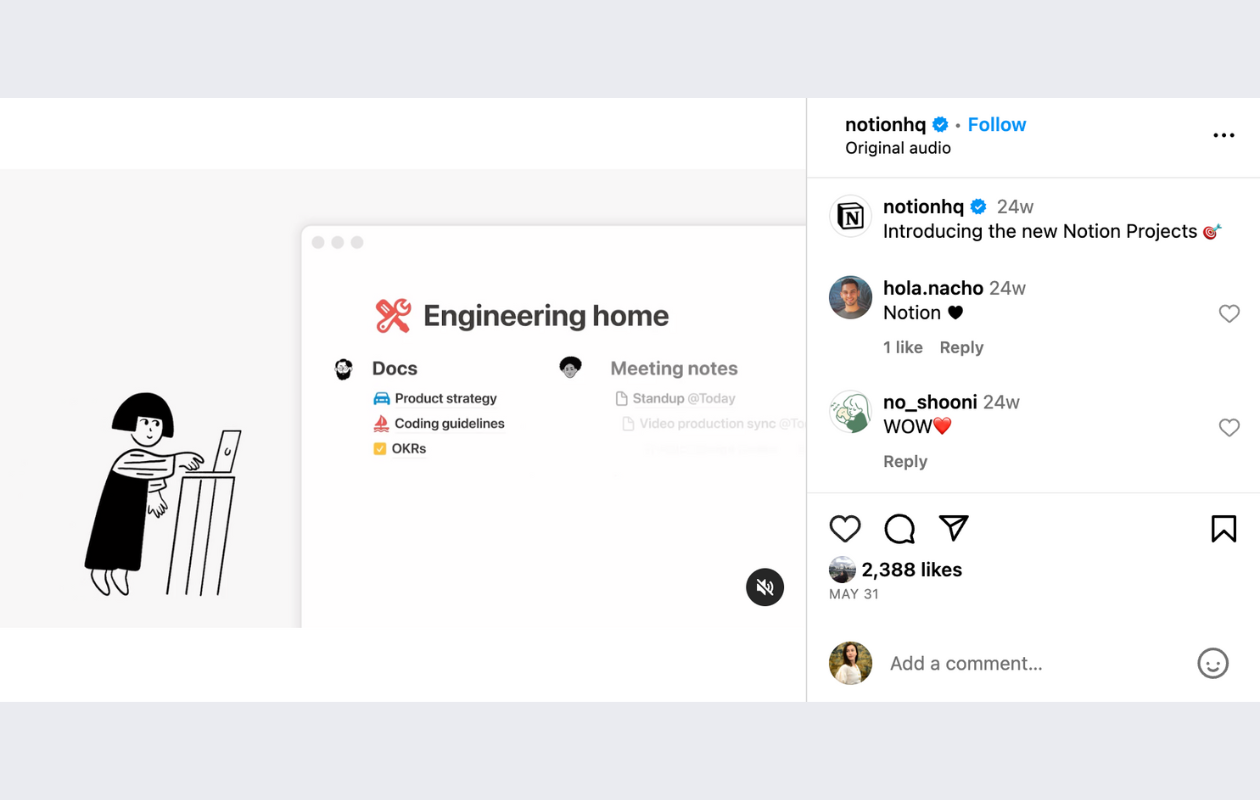
Aside from product posts, you will also find some employee spotlights and snippets from in-person meet-ups or other instances of OOH (out-of-home) marketing.

As you would expect from a brand that favors quality over quantity, they post rather rarely - only up to 3 posts per month. They keep their captions short and to the point, in classic minimalist style. Even when they announce big feature launches.
Case in point: their top-performing post (engagement-wise) from the last 6 months is this post introducing their latest AI-powered feature:
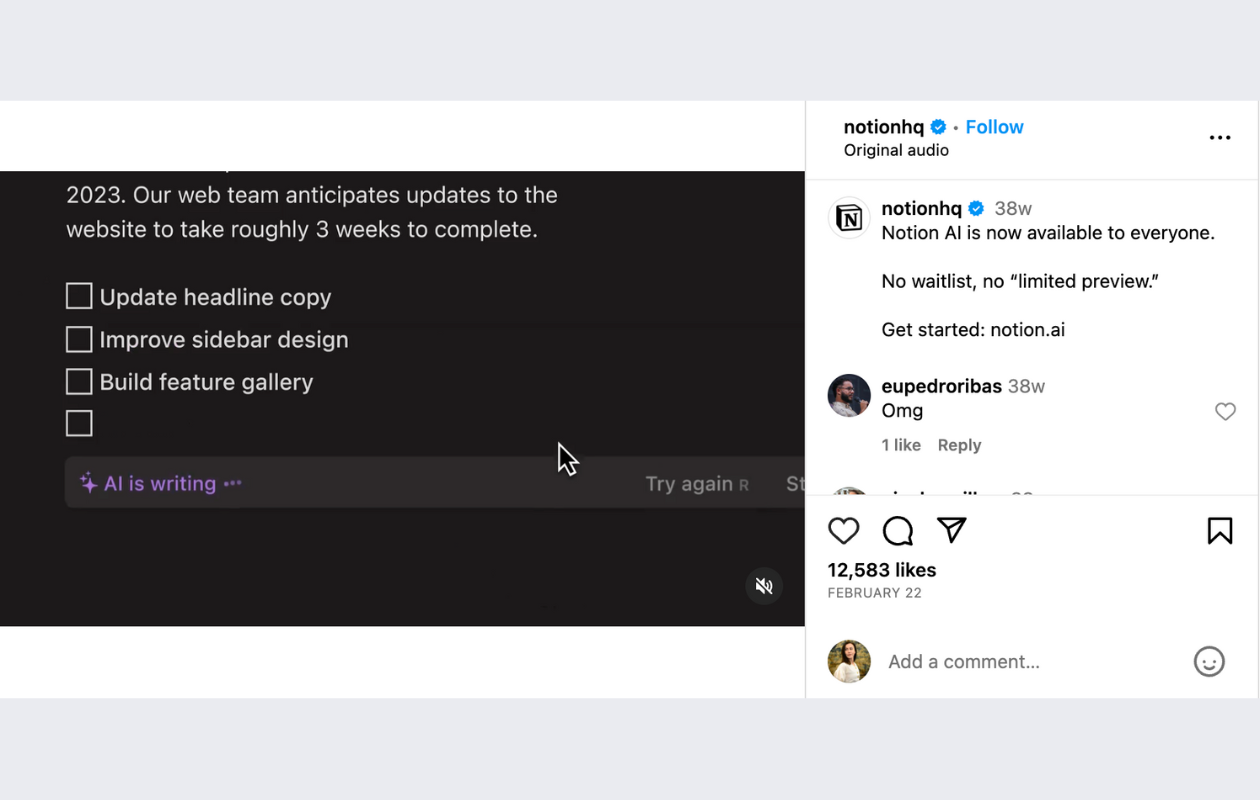
To sum up, Notion's marketing strategy on Instagram is defined by:
- client education through product updates and how-to videos
- employee spotlights
- instances of OOH (out-of-home) marketing
- short captions
- post type variety (carousels dominate, though)
3. How does Notion approach social media marketing on LinkedIn?
On LinkedIn, Notion has a similar strategy to Instagram, focusing primarily on product highlights and community updates.
For the most part, they do stick to these two types of posts, although occasionally they do hop on a popular trend if it makes sense for their product and brand identity.
Notion is far more active on LinkedIn than any other social channel. As you can see from the chart below, most of their posts from this month (August 2023) can be found on LinkedIn:
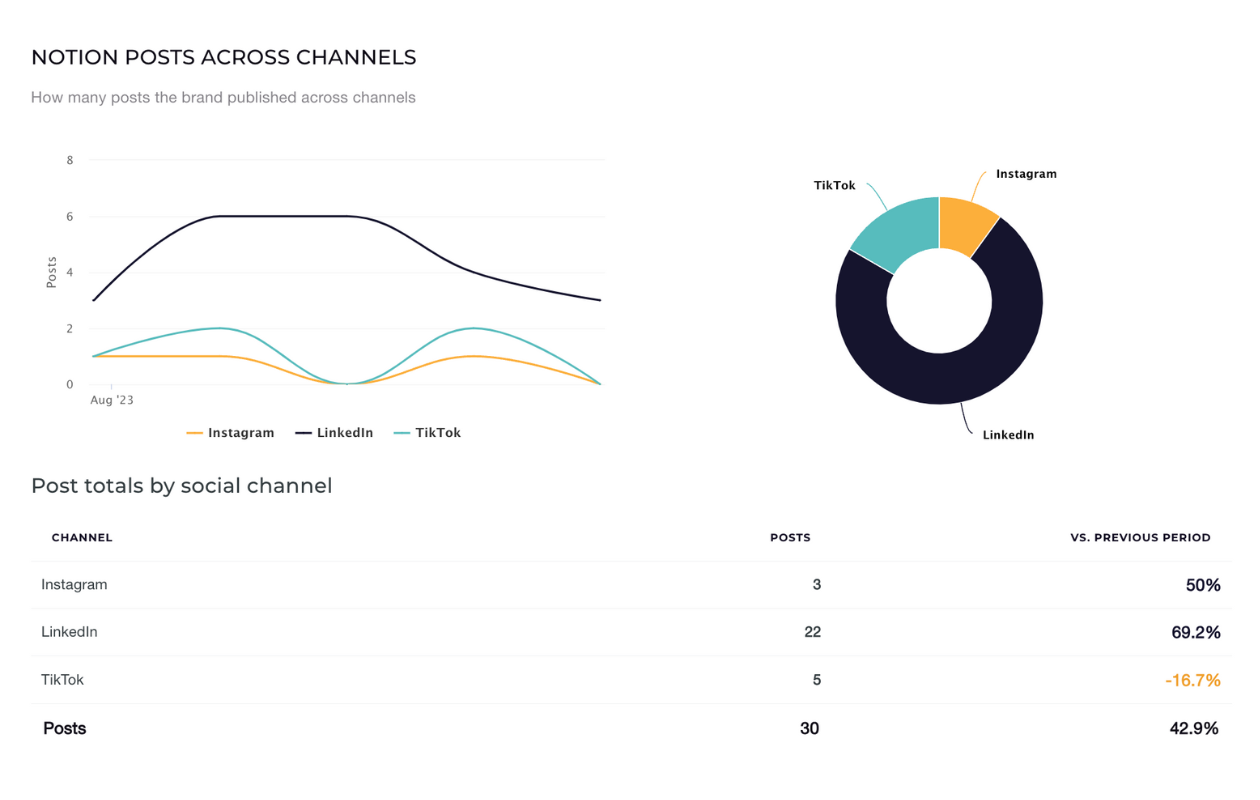
As a result, LinkedIn is also the platform with the largest community, followed by Instagram, then TikTok. It’s also their fastest growing channel at the moment, judging by followers growth data.

Notion's marketing strategy on LinkedIn includes the following:
- product highlights
- community spotlights
- brand advocacy
- memes (when they're a good fit for the brand)
4. What about Notion’s marketing strategy on TikTok?
On TikTok is where Notion goes to relax. This channel is home to many memes, popular trends, as well as some sporadic product highlights.
As I mentioned before, their TikTok by an influencer marketing lead, who leverages trends and comedic content to create a unique brand identity for Notion on TikTok, so as to appeal to a younger audience.
As Notion’s own social media manager points out, their audience spans from TikTok teens (individual users) to enterprise teams (entire companies). So it makes sense to produce content that serves both ends of the spectrum and everything in between.
TikTok is Notion’s most engaging platform, compared to Instagram and LinkedIn:

Which explains why the top 3 most engaged brand posts in the last 6 months are all from TikTok:

Interestingly enough, although Notion’s primary focus on TikTok is memes and popular trends, their top performing post in the last 6 months is a product feature, where the team answers a question from the audience.
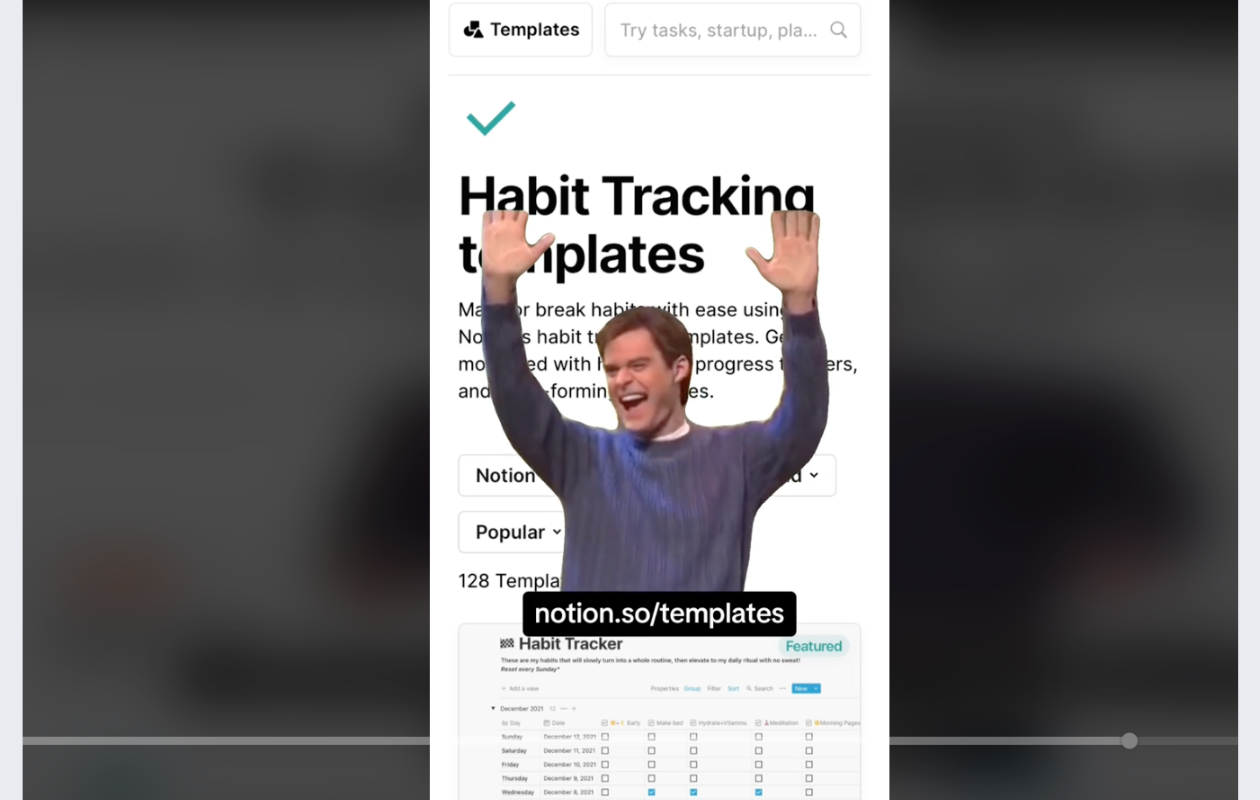
Most likely, this post owes its status to the fact that it highlights a hugely popular feature in the app (AI) and it offers guidance and value to the user.
In a nutshell, Notion's marketing strategy on TikTok features:
- memes
- popular trends
- product highlights / video tutorials
5. How to do a competitive brand analysis with Socialinsider
Doing a brand analysis on Notion was easy with Socialinsider. I just added the relevant profiles into the app, grouped them into a brand and voilà - I got instant access to all their valuable brand-level performance data.
But in order to have a real understanding of how well Notion is performing on social, I needed something to compare against. A benchmark, for context. So I added one of their top competitors - Clickup - in Socialinsider, to analyze their performance as well.
Once that was set up, I headed to the Benchmarks section to see competitive data and compare results.

At a brand level, Notion is clearly outperforming its competitors in all metrics selected.
It was interesting to see that although Clickup posts almost as often, they can’t even come close to Notion in terms of engagement rate. This data tells me that Notion’s slow growth, quality over volume philosophy is really paying off.

Final thoughts
Notion’s marketing strategy makes for a very interesting case study for anyone trying to decide if slow growth on social media is really achievable.
I believe Notion is living proof that you can grow slowly and steadily on social media, as long as your strategy is anchored in a solid brand identity and a deep understanding of your audience, and backed up by a valuable, fully functional product.
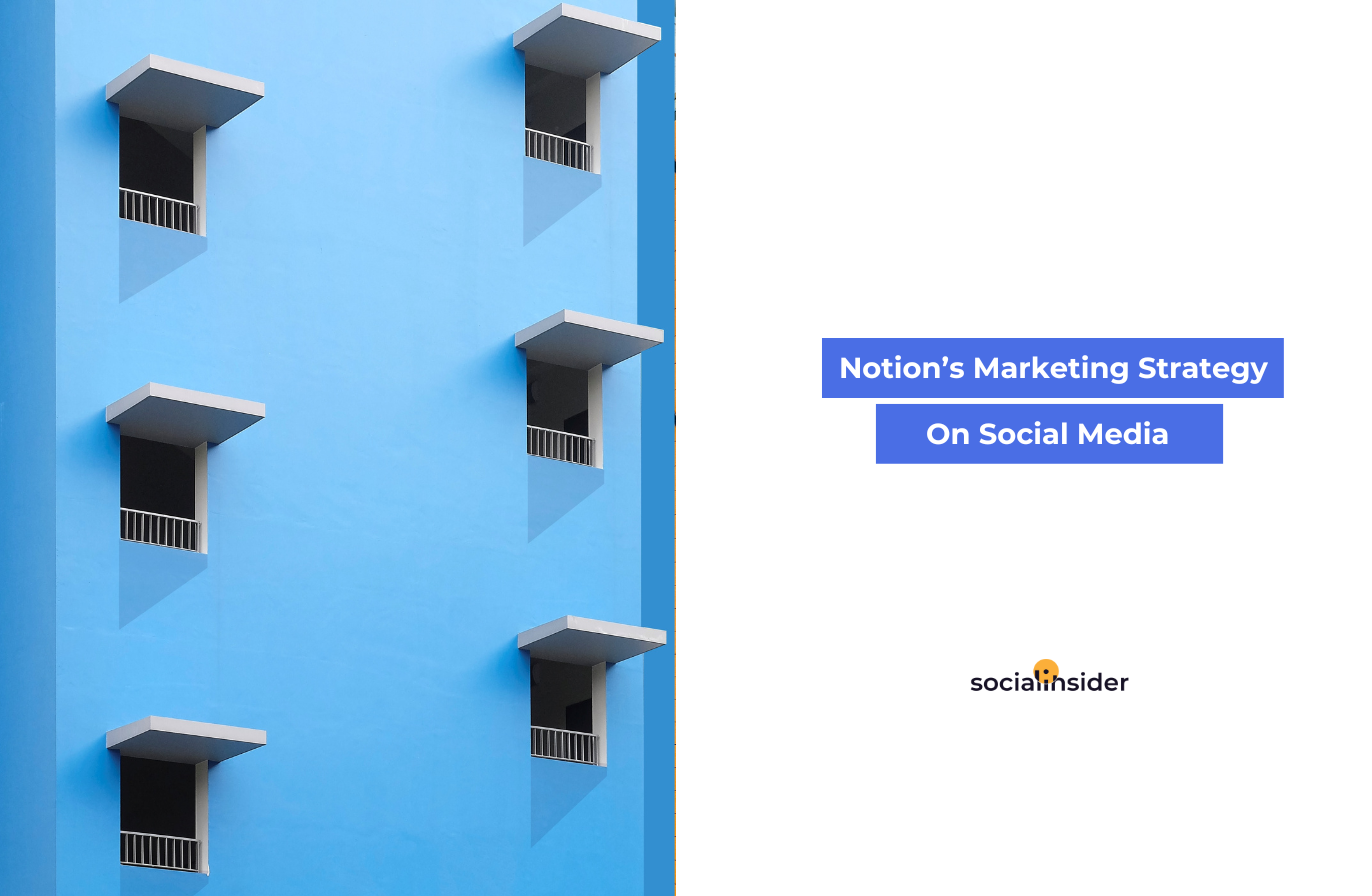







![[Brand Analysis] Innocent Drinks' Marketing Strategy: How Authenticity Defines Their Social Success](/blog/content/images/size/w1000/2022/12/innocent-drinks-marketing-strategy.png)

